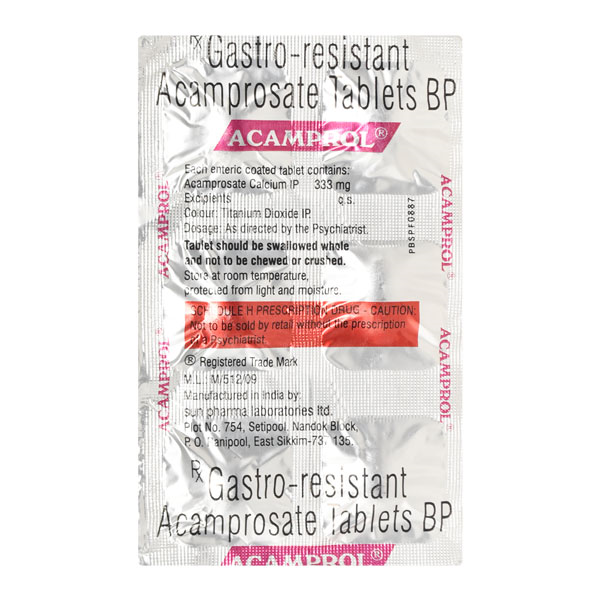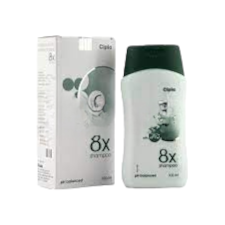Product Introduction:
ACAMPROL TABLET is a medication used in the management of alcohol dependence. It is prescribed to help individuals who have recently quit drinking alcohol to maintain abstinence. Acamprosate is often part of a comprehensive treatment plan that may include counseling and support to address alcohol use disorder.
ACAMPROL TABLET should be taken with food. It is only effective when you have completely stopped drinking alcohol. If you have missed a dose, take it as soon as you remember. Do not skip any doses and finish the full course of treatment. This medication mustn’t be stopped suddenly without talking to your doctor.
Some common side effects of using this medication are abdominal pain, nausea, vomiting, decreased libido, and itching. This medicine may cause diarrhea, so drink plenty of fluids to keep yourself hydrated while taking this medicine. Inform your doctor if you develop any unusual changes in mood or behavior, new or worsening depression, or suicidal thoughts or behavior.
You should have regular counseling sessions, as it will provide extra help to maintain abstinence from alcohol. Remember it will take time, support, willpower, and determination to readjust the habit of not drinking.
Uses:
The primary use of Acamprosate is to support abstinence in individuals who have successfully stopped drinking alcohol. It is not a cure for alcoholism but can be a helpful component in preventing relapse.
Benefits:
- Reduced Cravings: Acamprosate is believed to work by modulating the balance of neurotransmitters in the brain, reducing cravings for alcohol.
- Support for Abstinence: By helping individuals maintain abstinence, Acamprosate contributes to the overall success of alcohol dependence treatment.
Side Effects:
Common side effects of Acamprosate may include:
- Diarrhea
- Nausea
- Insomnia or sleep disturbances
- Anxiety or depression
Serious side effects are rare, but it’s essential to report any unusual or severe symptoms to a healthcare provider promptly.
Drug Interaction:
Acamprosate may interact with certain medications. It’s crucial to inform your healthcare provider about all the drugs you are taking, including prescription, over-the-counter, vitamins, and herbal supplements. Acamprosate is generally well-tolerated, and interactions are minimal, but it’s essential to ensure its compatibility with other medications.
Dosage:
The typical dosage of Acamprosate is 333mg, taken orally three times a day. It is usually initiated after a person has stopped drinking and is seeking support for maintaining abstinence. The duration of treatment may vary based on individual needs and response to therapy.
Working:
The exact mechanism of action of Acamprosate is not fully understood. However, it is thought to act on the balance of neurotransmitters in the brain, particularly gamma-aminobutyric acid (GABA) and glutamate. By modulating these neurotransmitters, Acamprosate may help reduce the cravings and withdrawal symptoms associated with alcohol abstinence.
Precautions:
- Kidney Function: Acamprosate is primarily excreted through the kidneys. Individuals with impaired kidney function may need dose adjustments or close monitoring.
- Allergies: Inform your healthcare provider about any known allergies or hypersensitivity to Acamprosate.
It’s important to use Acamprosate under the guidance of a healthcare professional. This medication is generally most effective when integrated into a comprehensive treatment plan that includes counseling and support for individuals recovering from alcohol dependence. If you experience any adverse effects or have concerns about your treatment, consult with your healthcare provider for guidance.
SAFETY ADVICE
Alcohol
CONSULT YOUR DOCTOR
It is not known whether it is safe to consume alcohol with ACAMPROL TABLET Please consult your doctor.
Pregnancy
CONSULT YOUR DOCTOR
ACAMPROL TABLET may be unsafe to use during pregnancy. Although there are limited studies in humans, animal studies have shown harmful effects on the developing baby. Your doctor will weigh the benefits and any potential risks before prescribing it to you. Please consult your doctor.
Breast feeding
SAFE IF PRESCRIBED
ACAMPROL TABLET is probably safe to use during breastfeeding. Limited human data suggests that the drug does not represent any significant risk to the baby.
ACAMPROL TABLET does not usually affect your ability to drive.
ACAMPROL TABLET should be used with caution in patients with kidney disease. Dose adjustment of ACAMPROL TABLET may be needed. Please consult your doctor.
Use of ACAMPROL TABLET is not recommended in patients with severe kidney disease.
ACAMPROL TABLET should be used with caution in patients with severe liver disease. Dose adjustment of ACAMPROL TABLET may be needed. Please consult your doctor.
Limited information is available on the use of ACAMPROL TABLET in these patients. No dose adjustment is recommended in patients with mild to moderate liver disease.










